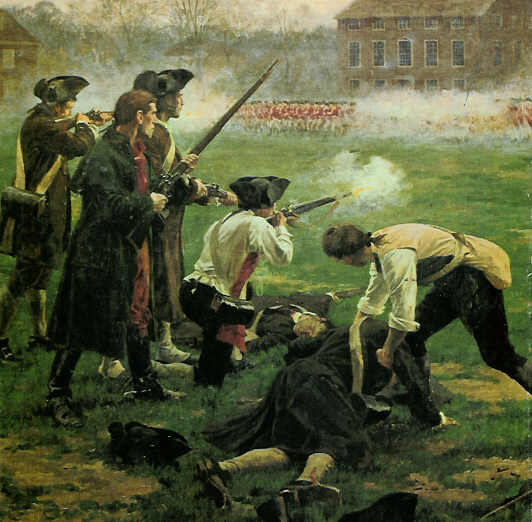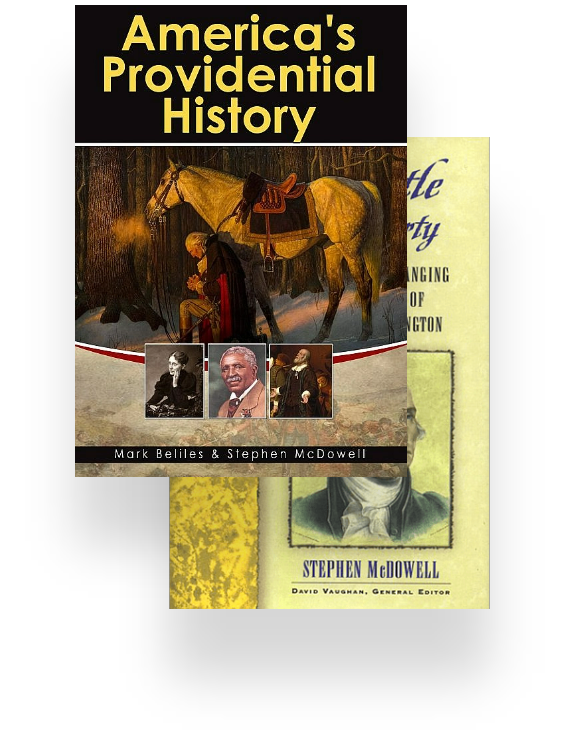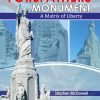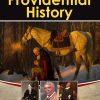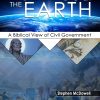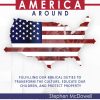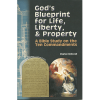By Stephen McDowell
Many Americans use Jefferson’s phrase, “a wall of separation between Church and State,” to describe what they believe the Constitution prescribes for the relationship of religion and civil government. Recent authors’ have aptly pointed out how many today misapply or do not understand the “wall” metaphor — how it has been cut off from its historical meaning and made to communicate ideas contrary to Jefferson and the founders of America. The phrase “separation of church and state” has been repeated so often in an improper context that many incorrectly believe that our Constitution mandates a strict separation, meaning a restriction of religious influence upon civil government and the public square. Many present the framers of the Constitution and the founders of America as irreligious men who were strict separationists, thus, giving us “a separation of church and state.”
The founders certainly believed in a jurisdictional separation of Church and state, where these two legitimate institutions had specific responsibilities and authority in their jurisdictions, and neither should encroach upon the other. But to the founders both of these were under the same Higher Authority who, as we will see, prescribed His will for man and the human institutions of family, church, and state through the laws of nature and nature’s God.
Honest examination shows that the founders were extremely religious men, who, not only had no qualms about letting their religious beliefs flow to civil matters, but considered, in the words of Washington, religion and morality the foundation of free governments. Even one of the least orthodox of the founders, Thomas Jefferson, mixed religion and civil matters in a way that would produce violent convulsions from modern separationist’s — writing laws punishing Sabbath breakers, granting the governor the authority to issue “days of public fasting and humiliation, or thanksgiving,” (including the punitive provision of a 50 pound fine on ministers failing to perform divine service on the appointed day), supporting the use of the Bible as a text in public schools, suggesting and approving the use of tax dollars to support missionaries.
A strict separationist view has produced many judicial rulings and actions of public and private figures that, while claimed as constitutional, would have been viewed as dangerous and subversive of liberty by those who gave us the Constitution. Some have been so ludicrous that almost everyone has reacted strongly, for example, the recent federal court ruling that it is unconstitutional for public school students to say “under God” in the Pledge of Allegiance. Strong reaction against the ruling came from many Democrats and Republicans, liberals and conservatives.
But others just as contrary to the views of the founders have passed with much less reaction, yet with the usual claim of their constitutionality, and accepted by many Americans as what our founders wanted. Thus, some things the courts have ruled as unconstitutional include: posting the Ten Commandments in schools (Stone v. Graham, 1980) and public buildings (Harvey v. Cobb County, 1993); having a prayer at a school graduation ceremony (Harris v. Joint School District, 1994); having a planter in the shape of a cross at a public cemetery (Warsaw v. Tehachapi, 1990); having a classroom library contain books which deal with Christianity, or for a teacher to be seen with a personal copy of the Bible at school (Roberts v. Madigan, 1990); displaying religious artwork in schools (Washegesic v. Bloomingdale Public Schools, 1993).
Even a cursory look at history shows many actions of the Founding Fathers, Jefferson included, would be considered unconstitutional by modern courts, and that the modern concept of separation of church and state has limited (if any) historical support. So then, why do so many people (citizens, judges, legislators, educators) not understand or misapply the “wall” metaphor (and similar ideas)?
There are various reasons for this. Certainly lack of knowledge or bad history is one chief reason. As Chief Justice Rehnguist wrote (dissenting in Wallace v. Jaffree, 1985):
The “wall of separation between church and State” is a metaphor based on bad history, a metaphor which has proved useless as a guide to judging. It should be frankly and explicitly abandoned.”2
Personal presuppositions (such as Justice Black’s view of Catholicism) is another, but it is not my intent to give an exhaustive list.
One fundamental reason, which also explains why those who have knowledge of the founders’ actions and thinking yet still embrace a strict separationist view claiming its constitutionality, is that America has been undergoing a change in the foundation of law and a change in the view of the nature and purpose of law. Modern rulings and actions reflect this philosophical change in law.
America’s founders generally had a Christian view of law, where law is rooted in the absolutes of a Supreme Creator who reveals His will (law) to man, while modern man generally has a humanistic or evolutionary view of law, seeing that it originates in man. This is evidenced not only in the legal and political arena, but in all areas of life. The differing views can be encapsulated by comparing the definition of immoral from the founding era with that of today.
Noah Webster, in his An American Dictionary of the English Language (1828), writes under his definition of immoral: “Every action is immoral which contravenes any divine precept, or which is contrary to the duties men owe to each other.” The standard for immoral action is “divine precept.” A modern Webster’s New World Dictionary defines immoral as “not in conformity with accepted principles of right and wrong behavior.”3 Thus, the consensus of man — not divine precept — determines right and wrong behavior.
The Founders’ Christian View of Law
To determine the founders’ view of law, we can examine: 1) the ideas of the political writers that shaped their thinking, 2) their own words, 3) the seminal constitutions, compacts, and charters of the colonies, 4) early laws written by the colonists, 5) documents in the early American republic, 6) court rulings, 7) the content of education in the schools, colleges, and textbooks.
Influential Political Writers
Dr. Donald Lutz conducted an exhaustive ten-year research of about 15,000 political documents of the Founders’ Era (1760-1805), and, from 916 of these items, recorded every reference our founders made to other sources. This list of 3154 citations reveals those writings and men that most shaped the political ideas of our founders. By far, the most quoted source of their political ideas was the Bible, 34% of citations. The next most quoted sources were individuals who had a Christian view of law — Montesquieu ( 8.3%), Blackstone (7.9%), and Locke (2.9%).4
Montesquieu
Baron De Montesquieu begins his The Spirit of Laws (1748) by commenting on laws in general, stating:
God is related to the universe, as Creator and Preserver; the laws by which He created all things are those by which He preserves them. He acts according to these rules, because He knows them; He knows them, because He made them; and He made them, because they are in relation of His Wisdom and power. 5
He says of the laws of the Creator used to govern the world: “These rules are a fixed and invariable relation.”6 Writing that all of creation are subject to God’s fixed laws, he points out how man “incessantly transgresses the laws established by God” setting up his own laws in place of God’s that flow from “a thousand impetuous passions.” To keep from forgetting his Creator, Montesquieu says that “God has therefore reminded him of his duty by the laws of religion . . .; philosophy . . . [and] by political and civil laws.” Then he speaks of the Laws of Nature: “The law which, impressing on our minds the idea of a Creator, inclines us towards Him, is the first in importance . . . of natural laws.”7
Sir William Blackstone
Blackstone was the next most quoted source. In his Commentaries on the Laws of England (1765), which was studied by lawyers in America for a century and a half, he writes:
[W]hen the supreme being formed the universe, and created matter out of nothing, he impressed certain principles upon that matter, from which it can never depart, and without which it would cease to be. When he put that matter into motion, he established certain laws of motion, to which all moveable bodies must conform. . . .
If we farther advance . . . to vegetable and animal life, we shall find them still governed by laws; . . . [As operations of inanimate and organic processes] are not left to chance, or the will of the creature itself, but are performed in a wondrous involuntary manner, and guided by unerring rules laid down by the great creator. . . .
Man, considered as a creature, must necessarily be subject to the laws of his creator, for he is an entirely dependent being. . . . And consequently as man depends absolutely upon his maker for every thing, it is necessary that he should in all points conform to his maker’s will.
This will of his maker is called the law of nature. . . .
This law of nature, being co-eval with mankind and dictated by God himself, is of course superior in obligation to any other. It is binding over all the globe, in all countries, and at all times: no human laws are of any validity, if contrary to this; and such of them as are valid derive all their force, and all their authority, mediately or immediately, from this original. . . .
The doctrines thus delivered we call the revealed or divine law, and they are to be found only in the holy scriptures. These precepts, when revealed, are found upon comparison to be really a part of the original law of nature. . . . As then the moral precepts of this law are indeed of the same original with those of the law of nature. . . . the revealed law . . . is the law of nature expressly declared to be so by God himself. . . .
Upon these two foundations, the law of nature and the law of revelation, depend all human laws; that is to say, no human laws should be suffered to contradict these.8
John Locke
The third most quoted source was John Locke who stated in “The Second Treatise of Government, ch. 1,”:
The rules that they [the legislators] make for other men’s actions must . . . be conformable to the law of nature — i.e., the will of God, of which that is a declaration — and the fundamental law of nature being the preservation of mankind, no human sanction can be good or valid against it.9
In his “Essay Concerning Human Understanding” he states his view on the source of truth:
The holy Scripture is to me, and always will be, the constant guide of my belief; and I shall always hearken to it, as containing infallible truth relating to things of the highest concernment. . . . [W]here I lack the evidence of things, there yet is ground enough for me to believe, because God has said it: and I shall immediately condemn and quit any opinion of mine, as soon as I am shown that it is contrary to any revelation in the holy scripture.10
Pufendorf
Samuel von Pufendorf (1.3% of citations) stated: “Our Saviour reduced the essence of the law to two heads: Love God and love your neighbor. To these heads can be referred the entire natural law.”11
Pufendorf was clear that “God . . . is the cause and origin of all things.”12 He wrote that “God is the author of the natural law”13 To understand natural law, “it is necessary to presuppose that God exists, and by His providence rules all things; also that He has enjoined upon the human race that they observe those dictates of the reason, as laws promulgated by Himself by means of our natural light.”14 “[M]an has been obliged by God to keep the same [natural law], as a means not devised by will of man, and changeable at their discretion, but expressly ordained by God Himself, in order to insure this end.”15
This is contrary to the modern view that law evolves as society changes and man can change the law at his discretion. These writers, as did America’s founders, believed that any law that is contrary to God’s law is no law at all.
When the founders wrote of “the laws of nature and of nature’s God” they understood this to mean what Locke, Blackstone, Montesquieu and others had presented; i.e. “the laws of nature” is the will of God revealed in creation and the conscience of man, and “the laws of nature’s God” is the will of God revealed in the Scriptures.
Sir Edward Coke
There were many prominent political writers who presented this view of law long before Montesquieu and Blackstone, including Sir Edward Coke and Hugo Grotius. These men were also quoted by America’s founders — Coke 1.3% of citations and Grotius, 0.9%. Coke, a noted English jurist,wrote in Calvin’s Case (c. 1610):
The law of nature is that which God at the time of creation of the nature of man infused into his heart, for his preservation and direction; and this is lex aeterna, the moral law, called also the law of nature. And by the law, written with the finger of God in the heart of man, were the people of God a long time governed, before the law was written by Moses, who was the first reporter or writer of law in the world. The Apostle in the Second Chapter to the Romans saith, Cum enim gentes quae legem non habent naturaliter ea quae legis sunt faciunt [While the nations who do not have the law do naturally the things of the law]. And this is within the command of the moral law, honora patrem, which doubtless doth extend to him that is pater patriae. And that the Apostle saith, Omnis anima potestatibus subdita sit [Let every person be subject to authorities]. And these be the words of the Great Divine, Hoc Deus in Sacris Scripturis jubet, hoc lex naturae dictari, ut quilibet subditus obediat superio. . . . [This God commands in Sacred Scripture, this the law of nature dictates, in order that anyone who is a subject might render obedience to the superior]. (T)herefore the law of God and nature is one to all…. This law of nature, which indeed is the eternal law of the Creator, infused into the heart of the creature at the time of his creation, was two thousand years before any laws written, and before any judicial or municipal laws. 16
Grotius
Hugo Grotius (1583-1645) was a Dutch political writer who systematized the law of nations. His view of law can be summarized in his statement: “What God has shown to be His will that is law.”17
Vattel
Quoted less often by the founders (.5%), yet a prominent writer who also adhered to a Christian view of law, Vattel, in The Law of Nations, said “all men . . . are to live conformably to their nature and to the designs of their common Creator.” 18 Vattel stated:
Piety and religion have an essential influence on the happiness of a Nation. . . . By piety I mean a disposition of soul which leads us to refer all our actions to God, and to seek, in everything that we do, to be pleasing to the Supreme Being. This virtue is an indispensable obligation upon all men;. . . . A Nation ought, therefore, to be pious. . . . An enlightened piety in the people is the firmest support of lawful authority. . . .
Piety should be enlightened. It is idle to propose to please God if one does not know the means to be taken. . . .
Every man is bound to endeavor to obtain correct ideas of God, to know His laws, His purpose with respect to His creatures, and the lot He has appointed to them.”19
All of these writers, while adhering to the basic premise that law was rooted in a being superior to man and who had a set of fixed moral laws, were certainly not uniform in their political or religious philosophy. For example, Thomas Hobbes (cited 1.0%), saw the “Holy Scripture” as the source “of what is law throughout all Christendom, both natural and civil,”20 but he believed, contrary to Reformation doctrine and the view of most early Americans, that the earthly religious and civil rulers were the sovereigns God used to establish His law in their dominion.21 The difference was not in the recognition of higher law, but in how such law would flow into society.
British philosopher David Hume (1711-1776) was the most quoted writer with a non-Christian view of law (at 2.7%). Citations were overwhelmingly from The History of England rather than from his works containing his views that the founders opposed. Even then, there were many who wrote negatively of Hume. James Madison considered him a “bungling lawgiver.”22 John Adams called him an “atheist, deist, and libertine.”23 Thomas Jefferson found him “endeavoring to mislead by either the suppression of a truth or by giving it a false coloring”24, and he lamented any influence Hume’s Treatise of Human Nature (1739-40) had had upon his thinking:
I remember well the enthusiasm with which I devoured it when young, and the length of time, the research and reflection which were necessary to eradicate the poison it had instilled into my mind.25
There were other writers (classical, rationalistic and atheistic enlightenment) cited by the founders who did not have a Christian view of law, such as Rousseau (0.9%), and Voltaire (0.5%). They were a very small minority of the total citations.26
The Words of the Founders
To substantiate that the founders held a Christian view of law, consider the words of early leaders, lawyers, and judges.
James Otis, an early leader in the struggle for independence, presented the colonists’ view of the laws of nature in his famous pamphlet “The Rights of the British Colonies Asserted and Proved”:
To say the Parliament is absolute and arbitrary is a contradiction. The Parliament cannot make 2 and 2, 5: Omnipotency cannot do it. The supreme power in a state . . . strictly speaking, belongs alone to God. Parliaments are in all cases to declare what is for the good of the whole; but it is not the declaration of Parliament that makes it so: There must be in every instance a higher authority, viz. God. Should an Act of Parliament be against any of His natural laws, which are immutably true, their declaration would be contrary to eternal truth, equity, and justice, and consequently void.27
Samuel Adams: “In the supposed state of nature, all men are equally bound by the laws of nature, or to speak more properly, the laws of the Creator.”28
John Jay, first chief-justice of the U.S. Supreme Court: “[T]he . . . natural law was given by the Sovereign of the Universe to all mankind.” 29
James Wilson (1742-1798), signer of the Declaration and the Constitution, U.S. Supreme Court Justice (1789-1798, appointed by Washington); professor of law at Philadelphia College (1790 ff), published with Thomas McKean “Commentaries on the Constitution of the United States (1792):
God . . . is the promulgator as well as the author of natural law.30
All [laws], however, may be arranged in two different classes. 1) Divine. 2) Human. . . . But it should always be remembered that this law, natural or revealed, made for men or for nations, flows from the same Divine source: it is the law of God. . . . Human law must rest its authority ultimately upon the authority of that law which is Divine.31
John Quincy Adams: “[T]he laws of nature and of nature’s God . . . of course presupposes the existence of a God, the moral ruler of the universe, and a rule of right and wrong, of just and unjust, binding upon man, preceding all institutions of human society and of government.”32
Alexander Hamilton, quoting Blackstone: “[T]he law of nature, ‘which, being coeval with mankind and dictated by God himself, is, of course, superior in obligation to any other. It is binding over all the globe, in all countries, and at all times. No human laws are of any validity, if contrary to this.” 33
Noah Webster, in his definition of law: The “ ‘Law of nature’ is a rule of conduct arising out of the natural relations of human beings established by the Creator and existing prior to any positive precept [human law]. . . . These . . . have been established by the Creator and are, with a peculiar felicity of expression, denominated in Scripture, ‘ordinances of heaven.’”34
Rufus King, signer of the Constitution: “[T]he . . . law established by the Creator . . . extends over the whole globe, is everywhere and at all times binding upon mankind. . . . [This] is the law of God by which he makes his way known to man and is paramount to all human control.” 35
William Findley, U.S. Congress, Revolutionary Soldier: “The law of nature being coeval with mankind and dictated by God Himself is of course superior to [and] the foundation of all other laws.”36
In Federalist 43, James Madison responds to the question, On what principle can the federation be superseded without the unanimous consent of the parties to it? (asked in 43.29), by replying:
The first question is answered at once by recurring to the absolute necessity of the case; to the great principle of self-preservation; to the transcendent law of nature and of nature’s God. (43.30)37
Jefferson is less explicit in stating his belief in the origin of law, but he was clear in his belief that rights do not originate from rulers or from man but from God and the universal law of nature: “The God who gave us life gave us liberty at the same time.”38 In the Declaration he speaks of “the laws of nature and of nature’s God” and “that all men . . . are endowed by their Creator with certain unalienable rights.”39
The first Americans to write law commentaries presented this same viewpoint.
Zephaniah Swift (1759-1823), lawyer, congressman, judge, Chief Justice of the Connecticut Supreme Court (1806-19), assisted in revising the laws of Connecticut and wrote the first law commentary in 1795-96 (A System of the Laws of the State of Connecticut), in which he stated:
[T]he transcendent excellence and boundless power of the Supreme Deity . . . [has] impressed upon them those general and immutable laws that will regulate their operation through the endless ages of eternity. . . . These general laws . . . are denominated the laws of nature.40
James Kent’s Commentaries on American Law (1826-30) served as the standard general treatise on law in the United States for many decades. Kent wrote in his commentaries:
Vattel . . . and all the other great masters of ethical and national jurisprudence, place the foundation of the law of nature in the will of God, discoverable by right reason, and aided by Divine revelation. . . .
The law of nature, by the obligations of which individuals and states are bound, is identical with the will of God, and that will is ascertained. . . either by consulting Divine revelation, where that is declamatory, or by the application of human reason where revelation is silent.41
Kent agreed with the “masters of jurisprudence” that law is rooted in Divine revelation. Joseph Story, Supreme Court Justice and author of a commentary on the Constitution, presents the same ideas in some of his writings.
Textbooks in schools also presented the view that law is rooted in Divine revelation. Andrew Young’s First Lessons in Civil Government (1846) states:
The will of the Creator is the law of nature which men are bound to obey. But mankind in their present imperfect state are not capable of discovering in all cases what the law of nature requires; it has therefore pleased Divine Providence to reveal his will to mankind, to instruct them in their duties to himself and to each other. This will is revealed in the Holy Scriptures, and is called the law of revelation, or the Divine law.42
There were those Americans who who did not have this Christian view of law, for example Thomas Paine. In the Declaration of Rights (1794, from prison in France) Paine wrote “the Law . . . is the expression of the general will. . . . [T]he rights of man rests on the national sovereignty. This sovereignty . . . resides essentially in the whole people.”43 Paine’s ideas on law, as well as his anti-Christian views, were not well accepted in America.44
The Seminal Constitutions, Compacts, and Charters of the Colonies
In the Colonial Origins of the American Constitution, Donald Lutz includes 80 foundational civil documents written in the American colonies. Even a brief examination of these confirms that all 13 colonies embraced a Biblical view of law. In his outline of “some of the things that a reading of these documents together leads us to conclude,” Lutz gives number one as: “Political covenants were derived in form and content from religious covenants used to found religious communities.” He writes that one element of a political covenant is “an oath calling on God as a witness or partner.”45
Quoting from just a few of these shows the Christian motives for founding the colonies and the recognition of God as the highest authority and source of law:
First Charter of Virginia (1606): The third paragraph of the charter speaks of their desire to propagate the “Christian Religion to such People, as yet live in Darkness and miserable Ignorance of the true Knowledge and Worship of God, and in time bring the Infidels and Savages, living in those parts, to human Civility, and to a settled and quiet Government.”46
The Mayflower Compact was written by a small group of English separatists seeking religious and civil freedom, who were undertaking the planting of a colony “for the Glory of God, and Advancement of the Christian Faith.”47
Adopted January 14, 1639, the Fundamental Orders of Connecticut began with the inhabitants covenanting together under God “to maintain and preserve the liberty and purity of the gospel of our Lord Jesus which we now profess.” It gave the governor and magistrates “power to administer justice according to the Laws here established, and for want thereof according to the rule of the word of God.”48
The Charter of Maryland (1632) revealed the motive of Catholic proprietor Cecil Calvert, Lord Baltimore, in establishing the colony of Maryland — “being animated with a laudable, and pious Zeal for extending the Christian religion.”49
Charter of Rhode Island (1663): The charter mentioned their intentions of “godlie edifieing themselves, and one another, in the holie Christian ffaith and worshipp” and their desire for the “conversione of the poore ignorant Indian natives.”50
The Salem Covenant of 1629: “We Covenant with the Lord and one with an other; and doe bynd our selves in the presence of God, to walke together in all his waies, according as he is pleased to reveale himselfe unto us in his Blessed word of truth.”51
Frame of Government of Pennsylvania (1682): The Preamble begins: “When the great and wise God had made the world, of all his creatures, it pleased him to chuse man his Deputy to rule it: and to fit him for so great a charge and trust, he did not only qualify him with skill and power, but with integrity to use them justly.”52
Section one of the Pennsylvania Charter of Privileges (1701) contains qualifications of officers where “all Persons who also profess to believe in Jesus Christ, the Saviour of the World, shall be capable (notwithstanding their other Persuasions and Practices in Point of Conscience and Religion) to serve this Government in any Capacity, both legislatively and executively.”53
Early Laws Written by the Colonists
“Laws Divine, Morall, and Martiall, etc.” written in Virginia between, 1609-1612: The colonists were required to serve God, to attend divine serves, to not speak against God or blaspheme God’s holy name, and to not speak or act in any way that would “tend to the derision, or despight [open defiance] of Gods holy word upon paine of death.”54
Laws of the Pilgrims (1636, revised 1658, 1671, 1685): The preface to the 1671 Book of Laws states that “Laws . . . are so far good and wholesome, as by how much they are derived from, and agreeable to the ancient Platform of Gods Law.”55 The specific statutes reflected their Biblical philosophy of life. They even quoted Scriptures to support many of their Capital Laws.
Massachusetts Body of Liberties (1641): Section 1 states that no man’s life or property can be taken except by some express law that has been sufficiently published, “or in case of the defect of a law in any parteculer case by the word of god.”56
What became know as The Blue Laws of Connecticut acknowledged “that the supreme power of making laws, and of repealing them, belong to God only, and that by him, this power is given to Jesus Christ, as Mediator, Math. 28:19. Joh. 5:22. And that the Laws for holinesse, and Righteousness, are already made, and given us in the scriptures.”57
The Frame of Government of Pennsylvania recognized the Lord’s Day (the Sabbath), Biblical standards for marriage — “all marriages (not forbidden by the law of God, as to nearness of blood and affinity by marriage) shall be encouraged,”— and Biblical qualifications for civil officials — “all . . . shall be such as possess faith in Jesus Christ.”58 All offenses against God were to be discouraged and punished, and many were listed. Religious freedom was granted to all persons “who confess and acknowledge the one Almighty and eternal God, to be the Creator, Upholder and Ruler of the world.”59
Documents in the Early American Republic
After independence the state constitutions acknowledged God as the Supreme Power and provided for the protection of God-given inalienable rights of man. Most required elected officials to take a Christian oath of office, thus subordinating themselves to the Highest Authority.
The Declaration of Independence, 1776: “the laws of nature and of nature’s God”; “all men are created equal, that they are endowed by their Creator with certain unalienable Rights”; “appealing to the Supreme Judge of the world for the rectitude of our intentions”; “with a firm reliance on the Protection of Divine Providence”
The Constitution of Maryland (1776) states: “it is the duty of every man to worship God in such manner as he thinks most acceptable to him; all persons, professing the Christian religion, are equally entitled to protection in their religious liberty.” The oath of office included “a declaration of a belief in the Christian religion.”60
The Constitution of Massachusetts (1780) acknowledged “the goodness of the great Legislator of the universe . . . His providence. . . . and devoutly imploring His direction.” It declared: “It is the right as well as the duty of all men in society, publicly, and at stated seasons, to worship the SUPREME BEING, the great Creator and Preserver of the universe.” It also recognized that “the happiness of a people, and the good order and preservation of civil government, essentially depend upon piety, religion, and morality.”61
The Constitution of New Hampshire (1784) recognized “morality and piety, rightly grounded on evangelical principles” as the “best and greatest security to government.”62
The Constitution of South Carolina (1776): “The qualifications of electors shall be that [he] . . . acknowledges the being of a God and believes in a future state of rewards and punishments.”63
The Constitution of Tennessee (1797): No person who denies the being of God, or a future state of rewards and punishments, shall hold any office in the civil department of this State.”64
The U.S. Constitution requires a Christian oath, acknowledges the Christian Sabbath, and is dated in the year of our Lord.65
The Northwest Ordinance (1789), Article III: “Religion, morality, and knowledge being necessary to good government and the happiness of mankind, schools and the means of education shall forever be encouraged.”66
Court Rulings
Church of the Holy Trinity v. United States (1892): In its ruling, the U.S. Supreme Court declared “this is a Christian nation” and presented much historical evidence for this.67
Updegraph v. The Commonwealth (1824): Supreme Court of Pennsylvania rules, “Christianity, general Christianity, is and always has been a part of the common law. . . ; not Christianity with an established church . . . but Christianity with liberty of conscience to all men.”68
The People v. Ruggles (1811): In this decision delivered by Chief Justice James Kent, the Supreme Court of New York said “we are a Christian people and the morality of the country is deeply engrafted upon Christianity and not upon the doctrines or worship of those impostors [other religions].”69
Vidal v. Girard’s Executors (1844): “It is also said, and truly, that the Christian religion is a part of the common law.”70
Runkel v. Winemiller (1799): the Supreme Court of Maryland ruled, “By our form of government, the Christian religion is the established religion.”71
City of Charleston v. Benjamin (1846): “Christianity is a part of the common law of the land.” “What constitutes the standard of good morals? Is it not Christianity? There certainly is none other. . . . The day of moral virtue in which we live would, in an instant, if that standard were abolished, lapse into the dark and murky night of Pagan immorality.”72
Lindenmuller v. The People (1860): The Supreme Court of New York ruled, “All agreed that the Christian religion was engrafted upon the law and entitled to protection as the basis of our morals and the strength of our government.”73
Shover v. State (1850): the Supreme Court of Arkansas ruled “the Christian religion . . . is recognized as constituting a part and parcel of the common law.”74
A look at education — most colleges and schools were Christian and the texts reflected their Biblical worldview75 — reinforces the idea that early America had a Christian view of law and life. As John Marshall, Chief Justice of the U.S. Supreme Court, said:
The American population is entirely Christian, & with us, Christianity & Religion are identified. It would be strange, indeed, if with such a people, our institutions did not presuppose Christianity, & did not often refer to it, & exhibit relations with it.76
In relation to law, early Americans certainly viewed it from a Christian perspective. But over the years that gradually began to change so that now most Americans have a humanistic view of law.
Humanistic View of Law
Time does not permit examining in any detail how this change occurred, but many things have contributed to the changing philosophical foundation of American society — changes in theological thought, educational systems, personal belief, et cetera. The changing view of law can be summarized by the actions and words of Roscoe Pound.
In his Spirit of the Common Law, Roscoe Pound, who was President of Harvard Law School in the 1920s, revealed the nature of the changing view of law in America. Pound recognized the Christian foundation of law in the United States but did not directly attack it. In fact, he said that the old Christian legal foundation was good and produced many good results; but, he went on to say that this foundation was not good enough to bring us into the modern era. According to him, we needed a new law system, one founded on a different premise. Pound and others claimed that law was rooted in the best that society had to offer—in the consensus of the society and what they deemed best for mankind—and as society grew and became better, the law would change with it. Evolving law and the sovereignty of the state replaced the absolutes of God’s law. Pound said “the state takes the place of Jehovah.”
Many in the judicial system began to embrace this evolving view of law and rejected the Christian understanding of absolute law rooted in a Higher Power. For example Supreme Court justice Benjamin Cardozo (appointed in 1932) said:
If there is any law which is back of the sovereignty of the state, and superior thereto, it is not law in such a sense as to concern the judge or lawyer, however much it concerns the statesmen or the moralist.77
Relativism began to affect judicial philosophy and constitutional interpretation, as reflected in the words of Charles Evans Hughes, Supreme Court Chief Justice from 1930 to 1941: “We are under a Constitution, but the Constitution is what the judges say it is.”78
A humanistic view of law and life, and moral relativism has spread to the point where today a majority of Americans embrace this idea. Its dissemination and influence is such that, according to one recent poll even a majority of those who claim to be Christian reject moral absolutes.79
The Importance of a Nation’s View of Law
What is the impact of the changing view of law in America?
A person’s and nation’s view of law is very important, for it determines what the people perceive as the purpose of law, and consequently what they will attempt to have the law and government do. A brief contrast of a Biblical and humanistic view of law reveals some of the potential impact of this change.
Contrast of Biblical and Humanistic View of Law
There is obviously no universal agreement on what a Biblical or humanistic philosophy of law is. The opponents of each view often present the other in an extreme manner. Hence, proponents of a Biblical view of law are presented as narrow extremists who want to take control of government and the judiciary and impose their moral code upon the nation. Humanists have been presented much in the way Jefferson was by his political opponents when he ran for President, as wanting to confiscate everyone’s Bibles and restrict religious worship. Neither are accurate representations of the majority. But the general nature of law from the two views is clear.
Law, from a Christian perspective and as the Founders of America viewed it, originates in the will of God, revealed in general to man through nature and his conscience, and more specifically in the revelation of the Scriptures. Law from a humanistic view is rooted in man, ultimately autonomous man, but practically in the state, and in the consensus of the majority, or of a powerful minority.
From a Biblical perspective man is fallen and fallible, has a sinful nature, and thus needs to be restrained. The Biblical purpose of civil law is to restrain the evil action of men in society. True law reveals what is right and wrong, and hence, exposes law-breakers. But law in itself cannot produce what is right, it cannot change the heart or attitude of man, therefore, the Christian acknowledges the inability to legislate good, or to make people moral by passing laws. However, the Christian recognizes the moral basis of all laws. All laws everywhere are based upon the moral presuppositions of the law-makers. Laws against murder reflect a moral belief. Laws against theft are based upon the command to not steal. All law has a moral concern. The important question to the Christian is whose morality does it legislate.
From a Christian presupposition then, the law cannot change or reform man; this is a spiritual matter. Man can only be changed by the grace of God. He cannot be legislated into a new morality.
Humanists see the evils in society and in man, but explain them differently than Christians. To the humanist there is no higher being than man. There is no incarnate Savior. From a humanistic perspective there is no hope of internal regeneration to save man, therefore, any salvation or transformation that occurs in men or nations must come from man. Historically, humanistic man has tended to use the instrument of law and government to attempt to bring such a transformation or “salvation.”
Having no other means of provision, of salvation, or of peace, humanistic man attempts to regulate and provide all things through government and law. It is only through the force of law that evil will be eliminated and utopia established on earth. Humanistic law is used to promote and advance humanistic morals. Such law, in conjunction with a corresponding educational system, is the only hope humanistic man has of establishing a “saved” or “righteous” — i.e., good and progressing — society.
To restate this, if there is no God who redeems man internally, then any elimination of problems brought on by what is in the heart of man must be done by man — often collective man and his government. The attempt will thus be made by government (at least those that have a vision for a progressing society) to use the instrument of law to bring more peace and goodwill among men and to eliminate all that is negative, such as poverty, crime, war, disease, prejudice, and ignorance.
From a Christian perspective, law can restrain sinful man from acting evilly, for the fear of punishment is a deterrent, but he cannot be changed by law. Unless the evil heart of man is changed, there will be no advancement toward a better society. Humanistic law seeks to save and change man internally. Since the government (and laws issued thereby) is the instrument for such change, the government becomes the savior in a humanistic society.
Therefore, there is a great potential for the humanist to see law (and the state from which it comes) as savior. This might not be overtly proclaimed, but is demonstrated by actions. Certainly man is the highest authority and the source of law in a humanistic society, and hence he is the god of that society, for the source of law of a society is the god of a society — and man will look to his god to assist him, to provide for him, and to save him.
To the founders, who had a predominantly Christian worldview, they saw God, through His Son, as their savior. The state served a legitimate but limited purpose to protect the life, liberty, and property of the citizens.
From a Christian perspective the state is limited. America’s founders certainly saw the state in this manner. As an example, in 1792 Congress considered a bill that would have given subsidies to cod fishermen in New England. Some few argued Congress had power to do so under the general welfare clause. Speaking against the bill, James Madison said first, this is a limited government with only the specified powers listed in the Constitution belonging to Congress, the executive, and judiciary, then:
If Congress can employ money indefinitely to the general welfare, and are the sole and supreme judges of the general welfare, they may take the care of religion into their own hands; they may appoint teachers in every state, county, and parish, and pay them out of their public treasury; they may take into their own hands the education of children, establishing in like manner schools throughout the Union; they may assume the provision for the poor; they may undertake the regulation of all roads other than post-roads.80
Imagine the reaction Madison would receive today for proposing no government involvement in schools, providing for the poor, and regulation of all roads.
There are people with a humanistic view of law who are for limited government. However, in nations that have embraced such a view, the state generally acts as the sovereign, where all spheres of life come under its authority and direction (for example, ancient Rome, the former U.S.S.R., and present day China). Similarly, there have been nations that have verbally embraced a Christian view of law but did not practice limited government. But those who founded America would argue that correct and consistent Christian thought would produce limited and free government. The history of America is a great confirmation of this.
Thus, one reason a people’s view of law is important is that it affects the scope and extent of civil government in a nation. It also affects the form of government.
The source and origin of law has to do with sovereignty, with ultimate authority, with a people’s view of “God”. For the source of law of a society is the God of that society. A people’s religion, by which is meant their ultimate source of authority, determines their view of law and everything else.
Christianity: the Support of Free Governments
America’s founder’s believed that religion affects the form of government in a nation. In a general sense they saw Christianity as the only support for a free, self-governed, and happy society.
John Adams said while President in 1798:
[W]e have no government armed with power capable of contending with human passions unbridled by morality and religion. Avarice, ambition, revenge, or gallantry, would break the strongest cords of our Constitution as a whale goes through a net. Our Constitution was made only for a moral and religious people. It is wholly inadequate to the government of any other.81
In 1838 the Legislature of New York said:
Our Government depends for its being on the virtue of the people, – on that virtue that has its foundation in the morality of the Christian religion; and that religion is the common and prevailing faith of the people.82
George Washington wrote in 1797: “Religion and Morality are the essential pillars of Civil society.”83 In his farewell address in 1796, he wrote:
Of all the dispositions and habits which lead to political prosperity, religion and morality are indispensable supports.84
James Madison wrote in 1825: “[T]he belief in a God All Powerful wise and good, is…essential to the moral order of the World and to the happiness of man.”85 In his Memorial and Remonstrance, he said:
Before any man can be considered as a member of Civil Society, he must be considered as a subject of the Governor of the Universe.86
Noah Webster wrote in his History of the United States:
[T]he genuine source of correct republican principles is the Bible, particularly the New Testament or the Christian religion.87
Benjamin Rush wrote in 1806:
Christianity is the only true and perfect religion, and that in proportion as mankind adopt its principles and obeys its precepts, they will be wise and happy.88
The father of American Geography, Jedidiah Morse wrote:
To the kindly influence of Christianity we owe that degree of civil freedom, and political and social happiness which mankind now enjoys.89
The Constitution of New Hampshire of June 2, 1784 stated:
[M]orality and piety, rightly grounded on evangelical principles, will give the best and greatest security to government, and will lay in the hearts of men the strongest obligations to due subjection.90
James McHenry, signer of the Constitution said:
The Holy Scriptures . . . can alone secure to society, order and peace, and to our courts of justice and constitutions of government, purity, stability, and usefulness. In vain, without the Bible, we increase penal laws and draw entrenchments around our institutions.91
Samuel Adams stated: “Religion and good morals are the only solid foundations of public liberty and happiness.”92
Charles Carroll, Signer of the Declaration, wrote: “Without morals a republic cannot subsist any length of time; they therefore who are decrying the Christian religion whose morality is so sublime and pure . . . are undermining the solid foundation of morals, the best security for the duration of free governments.”93
Thomas Jefferson wrote in 1809: “The practice of morality being necessary for the well-being of society, He [God] has taken care to impress its precepts so indelibly on our hearts that they shall not be effaced by the subtleties of our brain. We all agree in the obligation of the moral precepts of Jesus and nowhere will they be found delivered in greater purity than in his discourses.”94
Many other founders could be quoted to show that the generally accepted view of early America was that the Christian religion was the foundation of liberty and our free republican form of government. Early courts and congresses declared the same thing. For example, the U.S. House of Representatives resolved in 1854:
[T]he great vital and conservative element in our system is the belief of our people in the pure doctrines and divine truths of the gospel of Jesus Christ.95
Why did early Americans believe Christianity was essential to free government? They believed it contained the principles of liberty, and also the power to transform men from within to live as self-governed citizens. The Supreme Court of New York ruled (in People v. Ruggles, 1811): “[W]hatever strikes at the root of Christianity tends manifestly to the dissolution of civil government . . . because it tends to corrupt the morals of the people, and to destroy good order.”96
Thomas Jefferson noted: “The precepts of philosophy, and of the Hebrew code, laid hold of actions only. [Jesus] pushed his scrutinies into the heart of man, erected his tribunal in the region of his thoughts, and purified the waters at the fountain head.”97
To our founders, the religion of a people affected their civil and religious liberty. To them, Christianity laid the support for free governments in general, but it also affected the specific form of government. In The Spirit of Laws, Montesquieu presented the idea that a nation’s form of civil government is directly determined by its religion. Under the section on “Of Laws in Relation to Religion Considered in Itself, and in its Doctrines,” he writes:
The Christian religion, which ordains that men should love each other, would, without doubt, have every nation blest with the best civil, the best political laws; because these, next to this religion, are the greatest good that men can give and receive.98
He goes on to make the points, under titled sections: 1) “That a moderate Government is most agreeable to the Christian Religion, and a despotic Government to the Mahommedan” and 2) “That the Catholic Religion is most agreeable to a Monarchy, and the Protestant to a Republic”99 This is an important idea that should be explored by nations seeking to be free.
The foundation of law and government was important to our founders. Most of them would see the abandoning of “the laws of nature and nature’s God” for “the laws of men”, would lead to loss of liberty and a detrimental change in the scope, form, and function of our government.
Pound believed that the nation could not continue to advance if it retained the Christian foundation of law; the consensus of man must be the new source of law. The founders believed the “Supreme Judge of the World” must be the source, and that it was this foundation that produced a liberty and happiness unlike any in history. Time does not allow presenting arguments for which view is best, but having such forthright debates is essential.
Many today would disagree with our founders and their view of law, but most Americans are not aware of the founders view or of the changing nature of law in America and its importance for our future. Both views of law and the arguments for which view is preferable need to be clearly presented so people can more accurately decide what standard of law we will embrace; or who will be the source of law, and hence the God, our nation. PP
End Notes
1. See Daniel L. Dreisbach, Thomas Jefferson and the Wall of Separation between Church and State. New York: New York University Press, 2002; Daniel L. Dreisbach, “‘Sowing Useful Truths and Principles’: The Danbury Baptists, Thomas Jefferson, and the ‘Wall of Separation’”, Journal of Church and State, Vol. 39, Summer 1997, pp. 455-501; Religion and Political Culture in Jefferson’s Virginia, Garrett Ward Sheldon and Daniel L. Dreisbach, editors. New York: Rowman & Littlefield Publishers, 2000; Robert L. Cord, Separation of Church and State. New York: Lambeth Press, 1982; David Barton, Original Intent. Aledo, Tex.: WallBuilder Press, 1996.
2. Wallace v. Jaffree, 472 U.S. 38 (1985) at 92, 106-107 (Rehnquist, J., dissenting).
3. Noah Webster, An American Dictionary of the English Language (New York: S. Converse, 1828), definition of immoral. Webster’s New World Dictionary of the American Language, David B. Guralnik, editor (Nashville: The Southwestern Company, 1969), p. 373.
4. Donald S. Lutz, “The Relative Influence of European Writers on Late Eighteenth-Century American Political Thought,” The American Political Science Review, vol. 78, 1984, pp. 189-197.
5. Baron De Montesquieu, The Spirit of Laws, translated from the French by Thomas Nugent, 2 Vols. (New York: the Colonial Press, 1899), Vol. 1, p. 1.
6. Ibid., p. 2.
7. Ibid., p. 3.
8. Sir William Blackstone, Commentaries on the Laws of England (Philadelphia: Robert Bell, Union Library, 1771), vol. 1, 38-42.
9. From, The Second Treatise of Government, ch. 1, quoted in Gary T. Amos, Defending the Declaration, How the Bible and Christianity Influenced the Writing of the Declaration of Independence (Charlottesville, Vir.: Providence Foundation, 1994).
10. From, An Essay Concerning Human Understanding, vol.1, quoted in Amos, p. 55.
11. Samuel von Pufendorf, On the Duty of Man and Citizen According to Natural Law, translation by Frank Gardner Moore of the 1682 edition (New York: Oxford University Press, 1927, reprinted by the Legal Classics Library, 1993), p. X.
12. Ibid., p. 23.
13. Ibid., p. 19.
14. Ibid., p. 19.
15. Ibid., p. 20.
16. From Calvin’s Case (circa 1610), quoted in Gary Amos, Defending the Declaration, p. 43.
17. Hugo Grotius, Commentary on the Law of Prize and Booty, translated from the original manuscript of 1604 by Gwladys L. Williams (Oxford: Clarendon Press, 1950), vol. 1, p. 8.
18. E. De Vattel, The Law of Nations or the Principles of Natural Law Applied to the Conduct and to the Affairs of Nations and of Sovereigns, translation of the first edition of 1758 by Charles G. Fenwick (Washington: The Carnegie Institution, 1916, reprinted by the Legal Classics Library, 1993), p. 5.
19. Ibid., p. 53.
20. Thomas Hobbes, Leviathan, with selected variants from the Latin edition of 1668, Edwin Curley, editor (Indianapolis: Hackett Publishing Co., 1994), “Of the Number, Antiquity, Scope, Authority, and Interpreters of the Books of Holy Scripture,” Chapter XXXIII, p. 250.
21. Ibid.
22. James Madison, Letters and Other Writings of James Madison (New York: R. Worthington, 1884), Vol. IV, p. 58, to N.P. Trist in February 1830.
23. John Adams, Diary and Autobiography of John Adams, L.H. Butterfield, editor (Cambridge, MA: Belknap Press, 1962), Vol. II, p. 391, diary entry of June 23, 1779.
24. Thomas Jefferson, Memoir, Correspondence, and Miscellanies, From the Papers of Thomas Jefferson, Thomas Jefferson Randolph, editor (Boston: Gray and Bowen, 1830), vol. IV, p. 80, to John Norvell on June 11, 1807.
25. Thomas Jefferson, The Writings of Thomas Jefferson (Washington, D.C.: The Thomas Jefferson Memorial Association, 1904), vol. XII, p. 405, to Col. William Duane on August 12, 1810.
26. See Lutz, p. 194.
27. Sources of Our Liberties, Richard L. Perry, editor (New York: American Bar Foundation, 1952), pp. 264-265.
28. Samuel Adams, The Writings of Samuel Adams, Harry Alonzo Cushing, editor (New York: G.P. Putnam’s Sons, 1908), vol. IV, p. 356, to the Legislature of Massachusetts on January 17, 1794.
29. John Jay, The Life of John Jay, William Jay, editor (New York: J. & J. Harper, 1833), Vol. II, p. 385, to John Murray on April 15, 1818.
30. James Wilson, The Works of the Honourable James Wilson, Bird Wilson, editor (Philadelphia: Lorenzo Press, 1804), Vol. I, p. 64, “Of the General Principles of Law and Obligation.”
31. James Wilson, Works, Vol. 1, pp. 103-105, “Of the General Principles of Law and Obligation.”
32. John Quincy Adams, The Jubilee of the Constitution (New York: Published by Samuel Colman, 1839), pp. 13-14.
33. Alexander Hamilton, The Papers of Alexander Hamilton, Harold Syrett, editor (NY: Columbia University Press, 1961), Vol. I, p. 87, from “The Farmer Refuted,” February 23, 1775.
34. Noah Webster, An American Dictionary of the English Language (New York: S. Converse, 1828), definition of law, #3 and #6.
35. Rufus King, The Life and Correspondence of Rufus King, Charles R. King, editor (New York: G.P. Putnam’s Sons, 1900), Vol. VI, p. 276, to C. Gore on February 17, 1820.
36. William Findley, Observations on “The Two Sons of Oil” (Pittsburgh: Patterson and Hopkins, 1812), p. 35.
37. The Federalist, Edited by Michael Loyd Chadwick (Washington, D.C.: Global Affairs), p. 238.
38. Writings of Thomas Jefferson, ed. By Paul Leicester Ford (New York: G.P. Putnam’s Sons, 1892-1899), Vol. I, p. 447.
39. In his original draft Jefferson wrote of man as created with certain inherent and inalienable rights. The drafting committee changed this to the present wording, which Jefferson embraced.
40. Zephaniah Swift, A System of the Laws of the State of Connecticut (Windham: John Byrne, 1795), Vol. I, pp. 6-7.
41. James Kent, Commentaries on American Law, seventh edition (New York: William Kent, 1851), p. 2, 4.
42. Andrew W. Young, First Lessons in Civil Government (Auburn, N.Y.: H. And J.C. Ivison, 1846), p. 16.
43. Thomas Paine, “Declaration of Rights,” The Writings of Thomas Paine, Collected and edited by Daniel Conway (New York: G.P. Putnam’s Sons), Vol.3 , p. 129-130.
44. Even Benjamin Franklin, who was not an orthodox Christian, said Paine’s anti-Christian writings would only result in evil and should not be published (see The Works of Benjamin Franklin, Jared Sparks, editor. Boston: Tappan, Whittemore, and Mason, 1840, pp. 281-282.)
45. Colonial Origins of the American Constitution, edited by Donald S. Lutz (Indianapolis: Liberty Fund, 1998), pp. xxxv-xxxvi.
46. Sources of Our Liberties, Richard L. Perry, editor, New York: American Bar Foundation, 1952, p. 40.
47. Sources of Our Liberties, p. 60.
48. Sources of Our Liberties, p. 120.
49. The Charter of Maryland, June 20, 1632, in Sources of Our Liberties, p. 105.
50. Sources of Our Liberties, p. 169
51. Colonial Origins of the American Constitution, p. 35.
52. Sources of Our Liberties, p. 209.
53. Sources of Our Liberties, p. 256.
54. For the Colony in Virginea Britannia, Lawes Divine, Morall and Martiall, etc., compiled by William Strachey, edited by David H. Flaherty (Charlottesville: University Press of Virginia, 1969), pp. 10-11.
55. The Laws of the Pilgrims, A Facsimile Edition of The Book of the General Laws of the Inhabitants of the Jurisdiction of New-Plimouth, 1672 & 1685 (Wilmington, Del.: Pilgrim Society, 1977), p. 1.
56. Sources of Our Liberties, p. 148.
57. The Blue Laws of New Haven Colony, usually called Blue Laws of Connecticut . . . , By an antiquarian, Hartford: printed by Case, Tiffany & Co., 1838, p. 145.
58. Sources of Our Liberties, p. 216, 218, 220.
59. Sources of Our Liberties, p. 220.
60. Sources of Our Liberties, pp. 349, 350.
61. Sources of Our Liberties, pp. 373, 374.
62. Sources of Our Liberties, p. 382.
63. The Constitutions of the Several Independent States of America (Boston: Norman and Bowen, 1785), p. 146, South Carolina, 1776, Section 13.
64. The Constitutions of the Sixteen States (Boston: Manning and Loring, 1797), p. 274, Tennessee, 1796, Article VIII, Section II.
65. For a discussion of Christianity and the Constitution see Daniel L. Dreisbach, “In Search of a Christian Commonwealth: An Examination of Selected Nineteenth-Century Commentaries on References to God and the Christian Religion in the United States Constitution”, Baylor Law Review, Fall 1996, Vol. 48, Number 4, pp. 928-1000. See also Barton, Original Intent.
66. Sources of Our Liberties, p. 396.
67. Church of the Holy Trinity v. U.S.; 143 U.S. 457, 458 (1892).
68. Updegraph v. The Commonwealth; 11 Serg & R. 393, 394 (Sup. Ct. Penn. 1824).
69. People v. Ruggles; 8 Johns 545 (Sup. Ct. NY. 1811).
70. Vidal v. Girard’s Executors; 8 Johns 545 (Sup. Ct. NY. 1811).
71. Runkel v. Winemiller; 4 Harris & McHenry 256, 259 (Sup. Ct. Md. 1799).
72. City Council of Charleston v. S.A. Benjamin; 2 Strob. 508, 518-520, 522-524 (Sup. Ct. S.C. 1846).
73. Lindenmuller v. The People, 33 Barb 548, (Sup. Ct. NY 1861).
74. Shover v. State; 10 English 259, 263 (Sup. Ct. Ark. 1850).
75. See Stephen McDowell, Restoring America’s Christian Education (Charlottesville, Vir.: Providence Foundation, 2000).
76. Daniel L. Dreisbach, Religion and Politics in the Early Republic, Lexington, KY: The University Press of Kentucky, 1996, p. 113.
77. Benjamin Cardozo, The Growth of Law (New Haven: Yale University Press, 1924), p. 49.
78. Charles Evans Hughes, The Autobiographical Notes of Charles Evans Hughes, David J. Danelski and Joseph S. Tulchin, editors (Cambridge: Harvard University Press, 1973), p. 144, speech at Elmira on May 3, 1907.
79. Barna Poll conducted in the Spring of 2002. In a survey of adults and teenagers, people were asked if they believed that there are moral absolutes that are unchanging, or that moral truth is relative; 64% of adults said truth is relative to the person and situation. Among teenagers, 83% said moral truth is relative; only 6% said it is absolute. Among born-again Christians 32% of adults and 9% of teens expressed a belief in absolute truth. The number one answer as to what people believe is the basis for moral decisions was doing whatever feels right (believed by 31% of adults and 38% of teens).
80. “On the Cod Fishery Bill, granting Bounties,” February 7, 1792, in The Debates of the Several State Conventions on the Adoption of the Federal Constitution as Recommended by the General Convention at Philadelphia in 1787. . . , In Five Volumes, by Jonathan Elliot (New York: Burt Franklin R), Vol. IV, p. 429.
81. “A Letter to the Officers of the First Brigade of the Third Division of the Militia of Massachusetts, Oct. 11, 1798.” In The Works of John Adams, Second President of the United States (Boston: Little, Brown and Co., 1854), 9:228-229.
82. B.F. Morris, Christian Life and Character of the Civil Institutions of the United States (Philadelphia: George W.Childs, 1864), p. 239.
83. George Washington, Letter to the Clergy of Different Denominations Residing in and near the City of Philadelphia, March 3, 1797.
84. A Compilation of the Messages and Papers of the Presidents, By James D. Richardson (Washington: Bureau of National Literature and Art, 1910), 1:205-216.
85. James Madison, Letter to Frederick Beasley, Nov. 20, 1825.
86. James Madison, Memorial and Remonstrance, 1785, in Norman Cousins, “In God We Trust,” the Religious Beliefs and Ideas of the American Founding Fathers (New York: Harper & Brothers, 1958), p. 301.
87. Noah Webster, History of the United States (New Haven: Durrie & Peck, 1833), p. v.
88. Benjamin Rush, Essays, Literary, Moral and Philosophical (Philadelphia: printed by Thomas and William Bradford, 1806), p. 93.
89. Jedidiah Morse, Election Sermon given at Charleston, MA on April 25, 1799.
90. Sources of Our Liberties, p. 382.
91. Bernard C. Steiner, One Hundred and Ten Years of Bible Society Work in Maryland (Baltimore: Maryland Bible Society, 1921), p. 14.
92. Samuel Adams, The Writings of Samuel Adams, Harry Alonzo Cushing, editor (New York: G.P. Putnam’s Sons, 1905), Vol. IV, p. 74, to John Trumbull on October 16, 1778.
93. Bernard C. Steiner, The Life and Correspondence of James McHenry (Cleveland: The Burrows Brothers Company, 1907), p. 475, Charles Carroll to James McHenry on November 4, 1800.
94. Thomas Jefferson, The Writings of Thomas Jefferson, Albert Ellery Bergh, editor (Washington, D.C.: The Thomas Jefferson Memorial Association, 1904). Vol. XII, p. 315, to James Fishback, September 27, 1809.
95. Cited in B.F. Morris, p. 328.
96. Ruggles at 546.
97. Thomas Jefferson, Memoir, Correspondence, and Miscellanies, From the Papers of Thomas Jefferson, Thomas Jefferson Randolph, editor (Boston: Gray and Bowen, 1830), Vol. III, p. 509, to Benjamin Rush on April 21, 1803, Jefferson’s “Syllabus of an Estimate of the Merit of the Doctrines of Jesus, Compared with Those of Others.”
98. Montesquieu, Vol. 2, p. 27.
99. Ibid., pp. 29, 30.



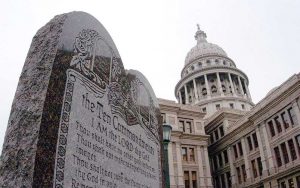 ing President. I can do whatever I want.”
ing President. I can do whatever I want.”
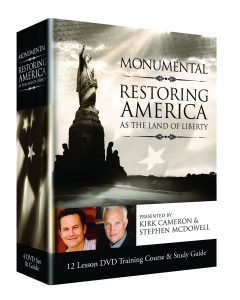 nt.
nt.
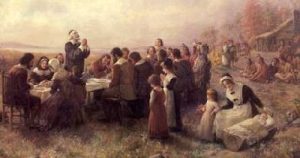 ilgrims settled by the mysterious extermination of the fierce Patuxet Indian tribe a few years earlier; 2) “The God-send,” Squanto, coming among the Pilgrims their first year, taking them under his care, teaching them how to survive in the new world, and helping to secure a peace treaty with the surrounding Indian tribes; 3) The establishment of an individual free-enterprise system which eliminated lack among them.2
ilgrims settled by the mysterious extermination of the fierce Patuxet Indian tribe a few years earlier; 2) “The God-send,” Squanto, coming among the Pilgrims their first year, taking them under his care, teaching them how to survive in the new world, and helping to secure a peace treaty with the surrounding Indian tribes; 3) The establishment of an individual free-enterprise system which eliminated lack among them.2